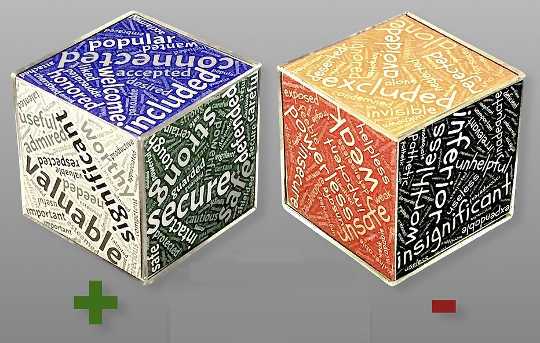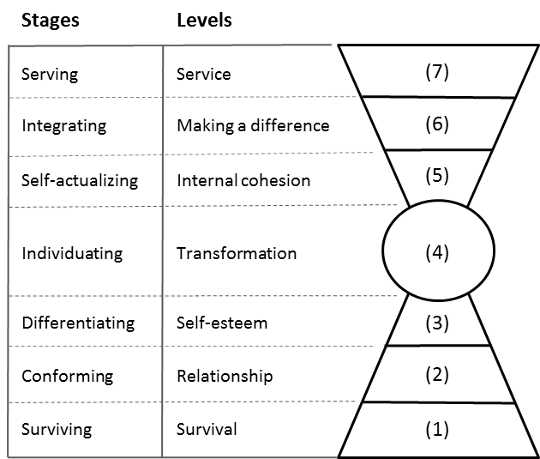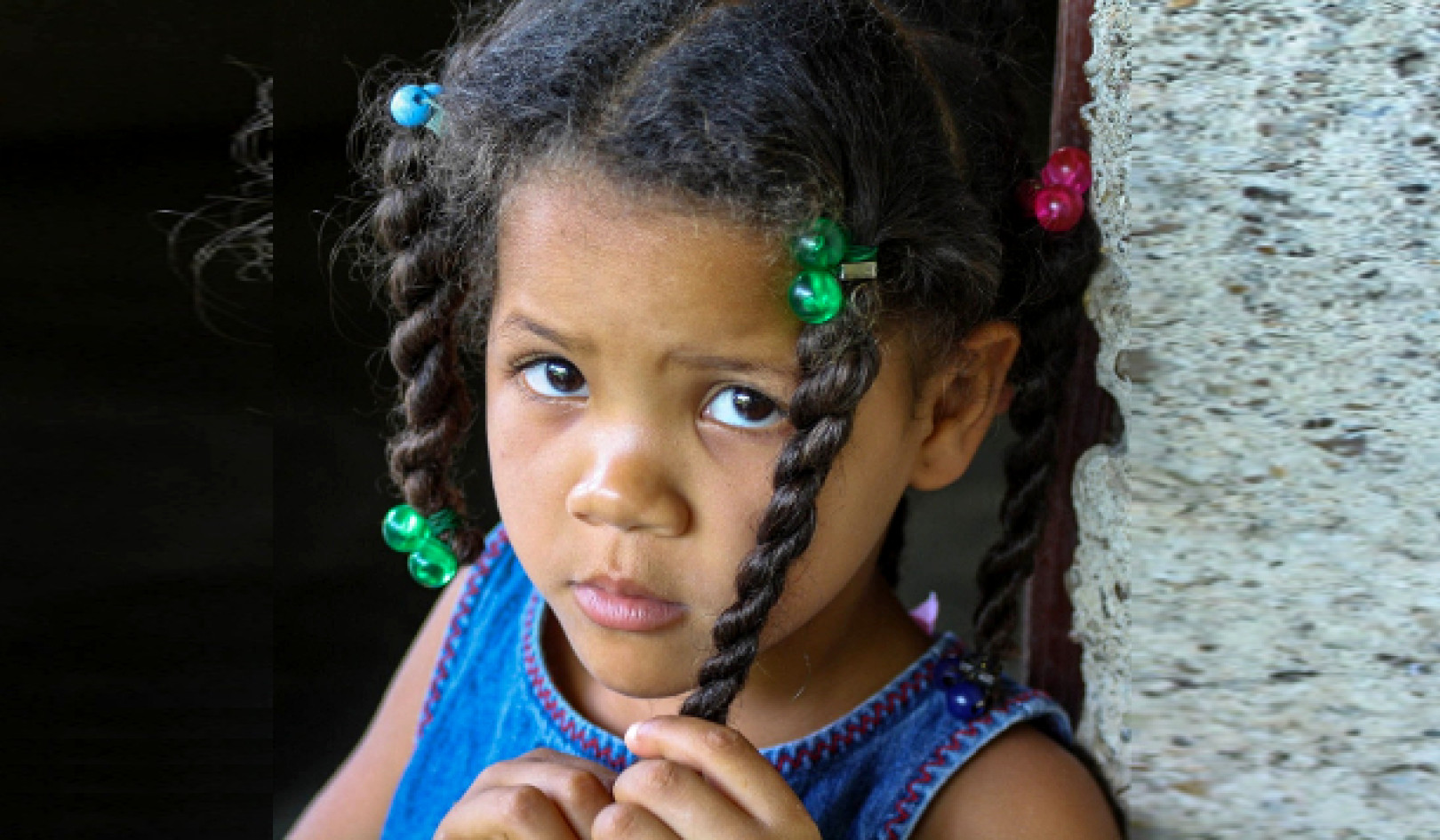
Everyone talks about consciousness as if it is something difficult to measure. But is it?
I started work on defining a metric for measuring human consciousness around 1995. It was an accident really; I was trying to bring together the ideas of Vedic philosophy regarding the higher levels of consciousness and Abraham Maslow’s hierarchy of needs.
It struck me that the different graduations of higher levels of consciousness, as expressed in the Vedic tradition, corresponded to the varying degrees of self-actualization expressed by Maslow. From this research came the idea for the Seven Levels of Consciousness Model.
Once I had defined the model, I quickly realized that specific values and behaviours could be associated with each level of consciousness, and consequently, if you could ascertain the values of an individual or group you could identify what levels of consciousness they were operating from.
The measuring system I developed became known as the Cultural Transformation Tools (CTT). In 1997, I formed a company, the Barrett Values Centre (BVC), and began to use this measuring system to map the consciousness of leaders and organizations all over the world. To date BVC has measured the consciousness of more than 5,000 organizations, 4,000 leaders and 24 nations.
In recent years, I began to recognize that in addition to mapping human consciousness, the Seven Levels Model could also be used as a template to describe the stages of human psychological development. Figure 1 shows the stages of psychological development and their correspondence with the seven levels of consciousness.
We grow in stages (of psychological development) and we operate at levels of consciousness. The Seven Levels Model differs from most other models in one important way: It looks at personal development through the lens of the ego-soul dynamic—the progressive, and normally subtle, influence of the motivations of the soul over the motivations of the ego.

Figure 1: Stages of psychological development and levels of consciousness
Under normal circumstances, the level of consciousness you are operating from will be the same as the stage of psychological development you have reached. However, no matter what stage of psychological development you are at, when you are faced with what you consider to be a potentially negative change in your circumstances or a situation that you believe could threaten your internal stability or external equilibrium—anything that brings up fear—you may temporarily shift to one of the three lower levels of consciousness.
Alternatively, if you have a “peak” experience—an experience of euphoria, harmony or connectedness of a mystical or spiritual nature—you may temporarily “jump” to a higher level of consciousness.
When the threat or peak experience has passed, you will return to the level of consciousness that corresponds to the stage of psychological development you were at before the experience occurred. In rare situations, a peak experience may have a lasting impact, causing you to shift to a higher stage of psychological development and operate from a higher level of consciousness.
Similarly a “negative” experience, if it is traumatic enough, and particularly if it occurs in your childhood and teenage years, can impede your future psychological development by causing you to be anchored, through frequent triggering of the traumatic memory, into in one of the three lower levels of consciousness.
Measuring Your Consciousness
Want to measure your consciousness? Well you can do so right away. Simply follow this link—www.valuescentre.com/pva — and do the free assessment like more than 100,000 people have done.
A few minutes after completing the assessment, you will receive a personalized feedback report. Look over the report and if you want to dig deeper, take some time to do the exercises you will find at the end of your report.
Levels of Consciousness
In order to understand the model, and what you have just done (if you have obtained your assessment), I would like to briefly describe the seven levels of consciousness.
Level 1: Survival consciousness
The first level of personal consciousness is concerned with your body’s physiological survival and your ego’s self-preservation. We need clean air, food, and water to keep our bodies alive and healthy. We also need to keep ourselves safe from harm and injury and defend ourselves from physical or verbal attacks. Whenever you feel threatened or insecure, physically or financially, you shift into survival consciousness.
Level 2: Relationship consciousness
The second level of personal consciousness is concerned with establishing and preserving relationships that engender a sense of emotional belonging. As young children, we learn very quickly that, if we don’t belong, we cannot survive. We also learn that, in order to belong, we need to be loved.
When you are loved unconditionally, you develop a healthy sense of relationship consciousness. You feel secure in yourself because you grew up feeling loved for who you are.
Level 3: Self-esteem consciousness
The third level of personal consciousness is concerned with establishing and maintaining your sense of self-worth. In order to feel good about ourselves we need to feel recognized and acknowledged by others, not just our immediate family, but also by our peers and the authority figures in our lives.
You build a healthy sense of self-worth when you are young by spending quality time with your parents; being praised for your accomplishments no matter what they are, and encouraged to keep trying even when things go wrong.
Level 4: Transformation consciousness
The fourth level of human consciousness is concerned with the search for your true identity. At this stage of development the questions you are asking yourself are “Who am I?”, “Who is the ‘I’ that lies beyond my parental and cultural conditioning?”, and “Who is the ‘I’ that wants to break out and be seen in the world?” Only when you answer these questions, can you discover your authentic self.
The prize that comes with the pursuit of self-knowledge is freedom: The freedom to express yourself with honesty and integrity. When you discover and express who you really are, you no longer have to hide behind the façade constructed by your ego. You will be able to march to your own tune, not the tune others have imposed on you.
To find out who you are, you will want to embrace adventure; you will want to discover and hone your skills and talents: you will want to become all you can become. You will want to embrace your soul self.
Level 5: Internal cohesion consciousness
The fifth level of human consciousness is concerned with finding meaning in your life—what you came into the world to do. At this level of consciousness, the question is no longer “Who am I?” but “Why am I here in this body, and in this situation?”
For some, those who do not feel any sense of purpose, this is a daunting inquiry. For others, who are gifted with a particular talent, your purpose may seem more obvious. If you are not sure of your purpose, simply focus on what you love to do and pay attention to what is immediately in front of you. Do it to the best of your ability. Alternatively just follow your joy, develop your talents, and pursue your passion. This will lead you eventually to where you need to be to fulfill your soul’s destiny.
Level 6: Making a difference consciousness
The sixth level of human consciousness is to make a difference in the world—in the immediate world that surrounds you, in your community or nation, or in the global society. Once you have found a purpose that gives your life meaning, you quickly learn that the difference you can make is much bigger if you collaborate with others who share a similar purpose or are aligned with your cause. This is where all the work you have done in learning how to manage, master, or release the emotions associated with your subconscious fears pays off.
The more easily you are able to connect and empathize with others, the easier it is to collaborate and thereby leverage your impact in the world.
Level 7: Service consciousness
The seventh level of human consciousness is selfless service to the cause that is the object of your soul purpose. You reach this level when making a difference becomes a way of life. You are now fully imbued with your soul purpose and living the life of a soul-infused personality. You are at ease with uncertainty and embrace whatever comes your way, without judgement. You are always looking for opportunities to grow and develop.
Full spectrum consciousness
It is important to recognize that higher is not necessarily better. Ideally, you should learn how to master all levels of consciousness. Individuals who are able to do this are said to be operating from full spectrum consciousness. They display all the positive attributes of the seven levels of personal consciousness:
* They master their survival needs by staying healthy, assuring their physiological survival and their financial security and keeping safe from harm and injury.
* They master their relationship needs by building friendships and family connections that create a sense of emotional belonging based on unconditional love.
* They master their self-esteem needs by building a sense of pride in themselves and their performance and acting responsibly and reliably in everything they do.
* They master their transformation needs by having the courage to embrace their authentic selves and letting go of the fears that keep them focused on their deficiency needs.
* They master their internal cohesion needs by uncovering their soul’s purpose and aligning the beliefs of their ego with the values of their soul.
* They master their making a difference needs by actualising their sense of purpose and leveraging their actions, and by collaborating with others who have a similar purpose or are aligned with the same cause.
* They master their service needs by leading a life of selfless service for the good of humanity and the planet.
Conclusion
What the Seven Levels Model enables us to do is make the evolution of consciousness, conscious: If you can measure something, you can manage it.
If you want to find out more about the stages of psychological development, the Seven Levels of Consciousness and how the Cultural Transformation Tools are used to measure consciousness of individuals, leaders, organizations and nations please read The Metrics of Human Consciousness.
©2018 by Richard Barrett. All Rights Reserved.
Book by this Author
The Metrics of Human Consciousness
by Richard Barrett.
 "Richard Barrett offers us an exciting new direction for measuring consciousness. He has proven that the insights these measures bring can significantly improve our individual, organisational and societal performance. The work of the Barrett Values Centre stands as a testament to what can be achieved by seriously applying ourselves to the measurement of conscious." Dr. Marc Gafni, Co-Founder and Director, Center for Integral Wisdom Dr. Zachary Stein, Academic Director, Center for Integral Wisdom
"Richard Barrett offers us an exciting new direction for measuring consciousness. He has proven that the insights these measures bring can significantly improve our individual, organisational and societal performance. The work of the Barrett Values Centre stands as a testament to what can be achieved by seriously applying ourselves to the measurement of conscious." Dr. Marc Gafni, Co-Founder and Director, Center for Integral Wisdom Dr. Zachary Stein, Academic Director, Center for Integral Wisdom
Click here for more info and/or to order this paperback book and/or download the Kindle edition.
About the Author
 Richard Barrett is an author, speaker and internationally recognised thought leader on the evolution of human values in business and society. He is the founder and chairman of the Barrett Values Centre, a Fellow of the World Business Academy, an Advisory Board Member of the Centre for Integral Wisdom, Honorary Board Member of the Spirit of Humanity Forum, and Former Values Coordinator at the World Bank. He is the creator of the Cultural Transformation Tools (CTT) which have been used to support more than 5,000 organizations in 60 different countries on their transformational journeys. Richard has been a visiting lecturer at the Consulting and Coaching for Change, Leadership Course run by the Saïd Business School at the University of Oxford and HEC in Paris. He has also been an Adjunct Professor at Royal Roads University, Institute for Values-based Leadership, and a visiting lecturer at the One Planet MBA at Exeter University. Richard Barrett is the author of numerous books. Visit his websites at valuescentre.com and newleadershipparadigm.com.
Richard Barrett is an author, speaker and internationally recognised thought leader on the evolution of human values in business and society. He is the founder and chairman of the Barrett Values Centre, a Fellow of the World Business Academy, an Advisory Board Member of the Centre for Integral Wisdom, Honorary Board Member of the Spirit of Humanity Forum, and Former Values Coordinator at the World Bank. He is the creator of the Cultural Transformation Tools (CTT) which have been used to support more than 5,000 organizations in 60 different countries on their transformational journeys. Richard has been a visiting lecturer at the Consulting and Coaching for Change, Leadership Course run by the Saïd Business School at the University of Oxford and HEC in Paris. He has also been an Adjunct Professor at Royal Roads University, Institute for Values-based Leadership, and a visiting lecturer at the One Planet MBA at Exeter University. Richard Barrett is the author of numerous books. Visit his websites at valuescentre.com and newleadershipparadigm.com.
Watch a video: Values, Culture & Consciousness (with Richard Barrett)
More books by this Author
at InnerSelf Market and Amazon



























